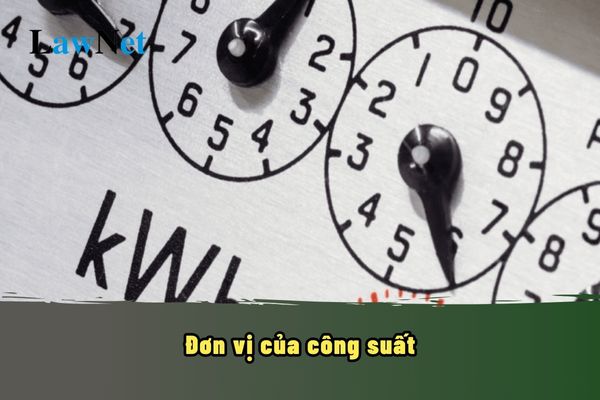What is the unit of power? When do students in Vietnam study the unit of power?
What is the unit of power?
The unit of power is Watt (abbreviated as W)
Watt is the unit of power in the International System of Units (SI).
One Watt is defined as the power when performing one Joule of work in one second.
Formula: 1W = 1J/s
Besides Watt, we use multiples of Watt to measure larger or smaller power:
Kilowatt (kW): 1 kW = 1000 W
Megawatt (MW): 1 MW = 1000 kW = 1,000,000 W
*Example of the unit of power:
The power of a light bulb is usually several tens of watts.
The power of an air conditioner can reach several kilowatts.
The power of a power plant can reach hundreds of megawatts.
*Significance of power:
Power indicates the rate of doing work.
The greater the power, the faster the work is done.
*Example of the unit of power:
A pump with greater power will pump more water in the same period than a pump with lesser power.
A car engine with greater power will help the car accelerate faster.
*Note: Information about the unit of power is for reference only./.

What is the unit of power? When do students in Vietnam study the unit of power? (Image from the Internet)
When do students in Vietnam study the unit of power?
Based on Section 5, Appendix of the Physics Education Program promulgated with Circular 32/2018/TT-BGDDT on the content required in the Grade 10 Physics Program:
Power and Efficiency
- From several real-life situations, discuss to outline the physical meaning and definition of power.
- Apply the relationship between power (or rate of work execution) and the product of force and velocity in some real-life situations.
- From real-life situations, discuss to outline the definition of efficiency, and apply efficiency in some practical cases.
Thus, according to the regulations, the unit of power will be studied in the Grade 10 curriculum.
What are regulations on classification of academic performance of Grade 10 students for the 2024-2025 school year in Vietnam?
Based on the regulations in Clause 2, Article 9 of the Regulation promulgated with Circular 22/2021/TT-BGDDT:
For subjects evaluated by comments combined with scores, the average grade per semester (ĐTBmhk) is used to assess the learning outcomes of students in each semester. The learning outcomes of students in each semester are evaluated according to one of four levels: Excellent, Good, Pass, Not Pass.
- Excellent Level:
+ All subjects evaluated by comments are rated as Pass.
+ All subjects evaluated by comments combined with scores have a ĐTBmhk of 6.5 or above, with at least 6 subjects having a ĐTBmhk of 8.0 or above.
- Good Level:
+ All subjects evaluated by comments are rated as Pass.
+ All subjects evaluated by comments combined with scores have a ĐTBmhk of 5.0 or above, with at least 6 subjects having a ĐTBmhk of 6.5 or above.
- Pass Level:
+ At most, 1 subject evaluated by comments is rated as Not Pass.
+ At least 6 subjects evaluated by comments combined with scores have a ĐTBmhk of 5.0 or above; no subject has a ĐTBmhk below 3.5.
- Not Pass Level: Other cases.
*Note: The evaluation level of learning outcomes for the semester or the entire school year decreases by at least two levels from the Excellent or Good level due to the results of only one subject; the evaluation of learning outcomes for that semester or school year can be adjusted to the adjacent level.
Additionally, if the student is disabled, the evaluation will be conducted according to the provisions of Article 11 of the Rules promulgated with Circular 22/2021/TT-BGDDT as follows:
- The evaluation of the conduct and learning outcomes of disabled students is performed per the principle of encouraging and motivating their efforts and progress.
- For disabled students studying through integrated education, the conduct and learning outcomes for subjects that the student can meet the requirements of the General Education Program are evaluated similarly to regular students but with reduced requirements.
Those subjects that disabled students cannot meet under the General Education Program are evaluated based on the individual education plan; no assessment is conducted for contents or subjects exempted.
- For disabled students studying through specialized education, the conduct and learning outcomes of subjects that the student meets the requirements of specialized education are evaluated according to the regulations for specialized education.
Subjects that disabled students cannot meet the requirements of specialized education are evaluated based on the individual education plan.

